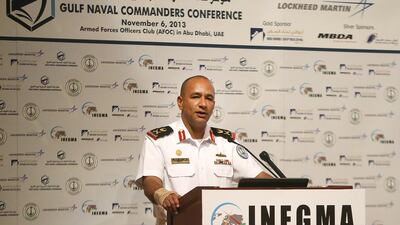ABU DHABI // Naval commanders from around the world gathered in the capital on Wednesday to discuss ways to counter rising maritime threats in the Arabian Gulf.
Naval officials said while piracy was decreasing, underwater threats such as submarines and smart mines were becoming harder to detect and disarm.
“We’re in a region where its livelihood depends extremely on sea lanes,” said Riad Kahwaji, chief executive of the Institute for Near East and Gulf Military Analysis, or Inegma.
“Without secured sea lanes the region cannot live, and therefore, the priority here is for maritime security, to have strong naval capabilities that will keep them secure and open at all times.”
Mr Kahwaji was at the second Gulf Naval Commanders Conference at the Armed Officers Club.
Commanders discussed many maritime threats including piracy attacks, but underwater threats were considered the most worrying as the waters of the Arabian Gulf were quite shallow.
“It’s very difficult to fight against submarines in shallow waters,” said Rear Admiral Antoine Beaussant, the commander of the French forces in the Indian Ocean.
“You need to have a lot of assets and it’s a very long investment. The best thing to do is to eliminate the submarine threats before they go at sea so it’s best to invest in special forces and air strikes than to invest in huge submarine forces.”
Rear Adm Ibrahim Al Musharrakh, Commander of the UAE Naval Forces, said the Gulf’s harsh environment made anti-submarine warfare “a real challenge for our units, with shallow waters significantly impacting detection by active sonars”.
Underwater threats include small submarines called midgets.
“Offshore activities and commercial traffic generating an important underwater ambient noise make it easier for electrically propelled midgets to operate undetected,” Rear Adm Al Musharrakh said.
“We need to have a fair assessment of the threat they represent for us and have a perfect knowledge of their characteristics, capabilities, missions, activities, area of patrols and weaknesses.”
Mr Kahwaji said midgets were hard to detect and could be lethal.
“They can be armed with four to six torpedoes,” he said. “They can launch surprise attacks, sink big ships and flee.”
Other threats include smart mines, which are triggered by heat or metal.
“They seek their targets,” Mr Kahwaji said. “They don’t just rest static as the old ones so these are what our neighbours in the Gulf and their allies are developing capabilities to deal with.”
Mines have been an issue in the Gulf since the 1980s.
“Any mine-laying operation would significantly reduce our ability to deploy safely our naval units at sea,” said Rear Adm Al Musharrakh.
“We need to be able to work together and concentrate our efforts along designated routes. We also need to get a permanent, up-to-date and real-time surface picture of the whole area to prevent the enemy from conduction any suspicious activities.”
Information-sharing between countries and special technological tactics and skills must be used to overcome the hurdles.
“Recent events worldwide have shown the vulnerability of the world we live in today and how fast things are changing,” said Maj Gen Rashad Al Saadi, Commandant at the UAE National Defence College.
“It underlines the importance of having modern armed forces in civilised nations, and no modern nation can claim to have a good military without an efficient naval force.
“We have invested in importing the latest technologies to stay in the forefront of modernity in our industries, trade and commerce and way of life.”
Anthony Winns, president of Middle East and Africa for US defence company Lockheed Martin, said it was a critical time for regional navies to collaborate on solutions.
“Maritime capability is not an option, it’s a necessity,” he said. “Social unrest and regional tensions abound today in the Arabian Gulf.
“The proliferation of asymmetric threats and piracy create challenges to the freedom of navigation and navies need to be able to operate without restriction, whether in the Gulf or in other spaces.”
cmalek@thenational.ae

